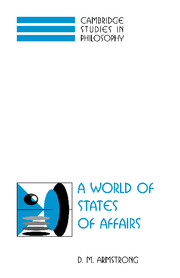Book contents
- Frontmatter
- Contents
- Preface
- 1 Introduction
- 2 Some preliminary doctrines
- 3 Properties I
- 4 Properties II
- 5 Powers and dispositions
- 6 Relations
- 7 Particulars
- 8 States of affairs
- 9 Independence
- 10 Modality
- 11 Number
- 12 Classes
- 13 Totality states of affairs
- 14 Singular causation
- 15 Laws I
- 16 Laws II
- 17 The unity of the world
- References
- Index
17 - The unity of the world
Published online by Cambridge University Press: 03 February 2010
- Frontmatter
- Contents
- Preface
- 1 Introduction
- 2 Some preliminary doctrines
- 3 Properties I
- 4 Properties II
- 5 Powers and dispositions
- 6 Relations
- 7 Particulars
- 8 States of affairs
- 9 Independence
- 10 Modality
- 11 Number
- 12 Classes
- 13 Totality states of affairs
- 14 Singular causation
- 15 Laws I
- 16 Laws II
- 17 The unity of the world
- References
- Index
Summary
This essay has upheld many of the central theses of the Logical Atomist programme, although the existence of atoms, simples, whether particulars or universals, is held to be a question for science rather than metaphysics, and one that we should at present remain agnostic about. The world divides, as Wittgenstein wrote, but it may divide ad infinitum, and there be no terminus even at infinity.
Logical Atomism owed a great deal to Hume, to his deflationary doctrine (or alleged doctrine as some have it) of causation as regular succession, and, more centrally, to the core Humean view that in metaphysics there are no necessary connections between distinct existences. We have rejected the Regularity theory, re-instating singular causation, real bringing about in the singular case. But we have accepted the Distinct Existences principle with no more than a clarificatory, though very important, amendment: there are no necessary connections between wholly distinct existences.
The world divides, we have maintained, into contingent states of affairs, whose constituents are (thin) particulars and universals, the latter comprising properties and relations. But a philosophy that divides the world must make provision for its unity. What provision have we made?
(1)The world is a mereological unity, a mereological whole embracing every part and constituent of the world. This is a ‘unity’ that does not unify. It is true that the parts supervene, are entailed by, the whole.
- Type
- Chapter
- Information
- A World of States of Affairs , pp. 263 - 269Publisher: Cambridge University PressPrint publication year: 1997



